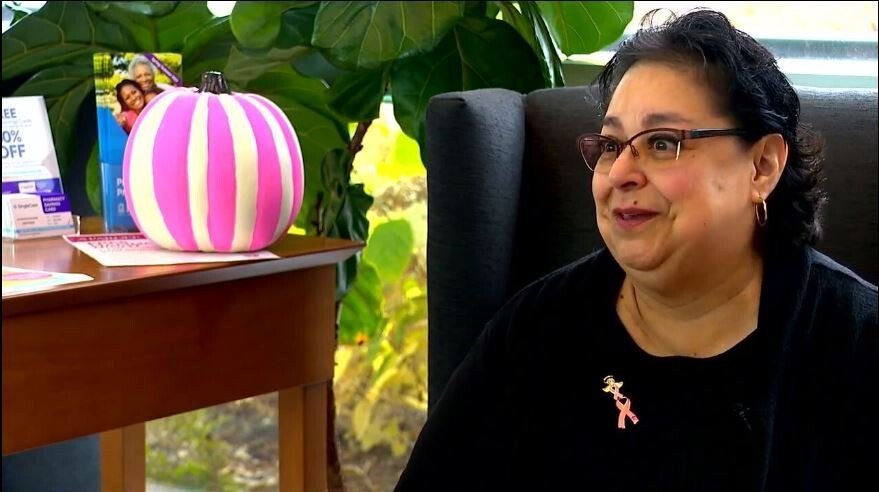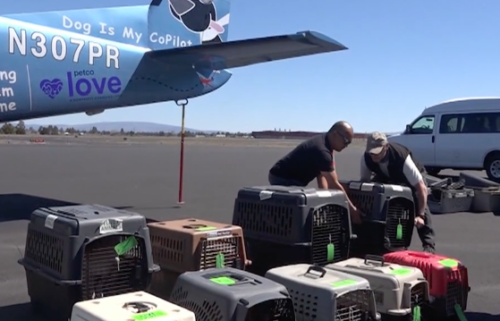Henderson Co. breast cancer survivor shares story, helps inform Spanish-speaking community

Henderson County
By Anjali Patel
Click here for updates on this story
HENDERSONVILLE, North Carolina (WLOS) — October is Breast Cancer Awareness Month, and, on average, 1 in 8 women will be diagnosed with it at some point in their life.
It’s the most common form of cancer that oncologists see at Pardee UNC Health Care in Hendersonville.
A Henderson County breast cancer survivor who was diagnosed last year is using her experience and bilingualism to raise awareness and help inform others who have been diagnosed.
Myrna Hermosillo had been getting mammograms annually for many years. She only skipped her annual screening in 2020 due to the COVID-19 pandemic. When she returned to Pardee in March 2021 to resume her yearly mammograms, she got news she hadn’t expected. Doctors had discovered an 11.8-millimeter tumor. It was so tiny that it wouldn’t have been detectable via a self-exam; only a mammogram could have caught it.
“In my case, my tumor was not where I could feel it, so the mammogram is really important,” Hermosillo said.
After further tests, she was diagnosed with breast cancer in April 2021.
“You start thinking, ‘What if I don’t make it? Am I going to die? Am I going to be cured?’ It’s difficult,” she said.
Hermosillo said she had no history of breast cancer in her family, so the diagnosis came as a shock. Her oncologist explained that heredity doesn’t often matter when it comes to breast cancer.
“Almost all breast cancers are not inherited. Most patients that we see do not have a family history of breast cancer. It’s probably 10 percent or less of patients actually have an inherited breast cancer,” said Dr. Jennifer McAlister, a breast surgical oncologist at Pardee Cancer Center.
Hermosillo said McAlister guided her through the treatment process after her diagnosis, helping her understand what would happen next.
“I asked her, ‘Please explain everything to me like a kindergarten level with apples and pictures and everything because I really need to understand what’s going on.’ And she did. She took the time to explain to me what the process was going to be,” Hermosillo said.
After a year of surgeries and chemotherapy, Hermosillo was proclaimed cancer free in March 2022. Like so many survivors, her emotional recovery, however, continues. What’s helping her heal is walking through the process with other women who have been diagnosed and primarily speak Spanish.
“Right after I was diagnosed and started treatment, a friend of mine was going through the exact same thing. We’re like a month and a half apart. She would call me, ‘I don’t know if this is normal, what do I do, who do I ask?'” Hermosillo said.
Hermosillo has become a support system for other local women who have been diagnosed, helping to inform them, and teaching them to advocate for themselves.
“It’s very interesting how you learn, and then I’m able to help others, and tell them, ‘Yes, you have to do this. This is going to happen now, it’s normal, it’s part of the treatment. It’s OK for you to feel this way. There are moments where you feel like you don’t want to do it anymore. It’s OK, you have the right to be upset, to be unhappy, to cry,'” Hermosillo said. “You try to help through your own experience.”
McAlister applauded her patient’s efforts to help inform her community.
“It is so nice that she is reaching out and taking it upon herself to do that because there are communities out there that we’re not reaching ourselves. We can put up all the signs and posters and advertisements, but, if it’s not getting into those communities, it’s not doing them any good,” McAlister said.
McAlister and Hermosillo stressed the importance of keeping up with annual mammograms. Thankfully, Hermosillo’s cancer was detected early, only traceable via mammogram.
“There would have been no way any doctor could have felt it or that she would’ve felt it on self-exam. The mammogram was the only way we knew it was there,” McAlister said.
While the number of patients getting mammograms at Pardee dropped during 2020 pandemic lockdowns, McAlister said it’s reassuring to see those numbers increasing.
She said, historically, mammograms have been considered painful and uncomfortable. She said Pardee uses the SmartCurve System to conduct the screening, which helps with comfort.
McAlister said there are things women can do to modify their risk of breast cancer. The risk for breast cancer increases with aging. Being a woman and aging are two risk factors that cannot be modified.
“The things that we can modify are the things we do to be healthy for anything else: diet, exercise, moderate alcohol use which is one drink per day, not smoking,” McAlister said.
Please note: This content carries a strict local market embargo. If you share the same market as the contributor of this article, you may not use it on any platform.



